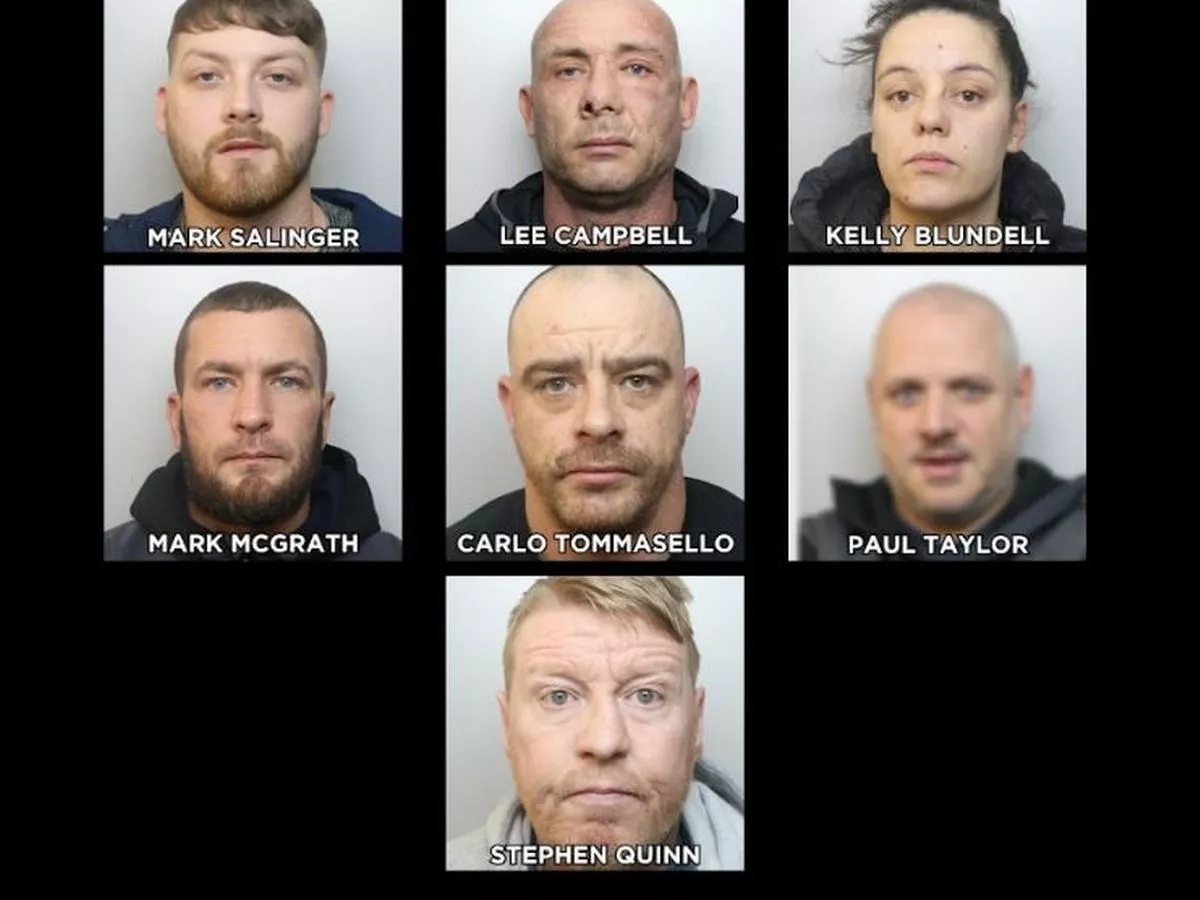Copyright manchestereveningnews

Seven members of a drugs gang led by Thomas Campbell before his murder have been sentenced for their part in a £1.6m cocaine supply racket. Thomas Campbell was brutally murdered in his own home in Mossley, Tameside , in 2022, after his ex-wife plotted with a gang of robbers who pounced on him as he walked into his home. Following his death, his brother Lee Campbell 'took control' as the head of the Campbell organised crime group, prosecutor Emma Swindel told Manchester Crown Court on Friday. The hearing ended with Lee Campbell, 43, and six other members of the gang being sentenced for their part in a £1.6m plot to supply class A drugs in north Manchester and Tameside. Police launched Operation Kilowatt into the Campbell family organised crime group whose 'principle' member was Thomas Campbell until his murder in 2022 , Ms Swindel told the court. Lee Campbell then 'took control', the court was told. Investigators identified a 'graft line', the mobile phone number used to supply drugs, and this led police to other members of the gang who shifted 16.5 kilos of class A drugs between March 14, 2024, and January 30, 2025. Greater Manchester Police launched a surveillance operation which captured another gang member, Carlo Tommasello, walking into woods at Philips Park in Clayton , east Manchester, on six occasions. On another occasion Lee Campbell was observed going into the woods where he was seen burying a large amount of cocaine. Police later dug up a package which contained zip-sealed plastic bags containing drugs worth an estimated £6,200. According to GMP, drug runner Steven Quinn, 'featured heavily in the day-to-day dealing' while Tommasello and another gang member, Kelly Blundell, were said to work closely with Campbell as he ran the business. Lee Campbell, the court heard, had 11 sets of previous convictions for 18 offences to his name, having served a three-year nine-month sentence for robbery while in 2015 he was jailed for four years for possession with intent to supply cocaine. The father, who was said to be receiving therapy for his brother's death, was in contact with numbers abroad to source drugs, according the prosecution. He 'inherited' the business from his late brother and operated as a 'customer of those higher up in the distribution of cocaine', his barrister Ian McMeekin told the court. While on remand, prison bosses had reported the defendant's 'positive work ethic'. He said his client was 'on the road to rehabilitation'. The Recorder of Manchester Nicholas Dean KC said: "Effectively Mr Campbell was running the family business. He wasn't running a corner shop and nor was he running a hypermarket. It was somewhere between, perhaps a small supermarket." Quinn, who had 13 previous convictions to his name including one for possession of crack cocaine, who the prosecution say acted as a street dealer 'on a significant scale', had 'little influence on others' in the gang and had 'shown incite' into his crimes, according to his barrister Amy Weir. Kelly Blundell, a foster carer who answered the drugs line and co-ordinated the supply of cocaine, had acted 'under direction' and her crimes were 'out of character', said her barrister Joshua Bowker. She had found the murder of Thomas Campbell 'difficult to come to terms with' and had got involved in the operation as she had become 'addicted' to online gambling on which she squandered her benefits, said Mr Bowker. Another gang member, former spray painter Mark McGrath, got involved because of debts accrued from his cannabis addiction, according to his barrister Jane Greenhalgh. The father had acted 'very much out of character', said Ms Greenhalgh. The youngest member of the gang, Mark Salinger, who was 22 at the time of the conspiracy, was paid £80-a-day as a drugs runner but he was 'at the bottom of the chain', according to his barrister Stephen Spence. He had acted 'out of familial loyalty naively', said Mr Spence. Another member of the gang, 41-year-old father of two and former deliver driver Paul Taylor, who has spent timed in the armed services until his retirement on medical grounds in 2003, had operated as a 'street dealer', the court heard. He had 18 previous convictions including for possession with intent to supply cannabis. He had been addicted to cocaine and 'struggled financially' when he became involved 'for a modest wage', said his barrister. Lee Campbell's gym buddy Carlo Tommasello, 38, operated the 'graft phone' for up to £150-a-day. But there was 'no evidence' he enjoyed a lavish lifestyle', said his barrister Jonathan Duffy. Recorder Dean told the court: "The conspiracy was led by Lee Campbell. I accept that Lee Campbell took over the business from his brother Thomas who was murdered in 2022. That, it seems to me, amounts to little by way of mitigation although I accept his brother's death will have had a significant impact on him." He said Lee Campbell had played a 'leading' role as it was 'essentially his business'. The judge told the defendant: "You played without doubt a leading role. This was essentially your business. "You were operating essentially for profit and the conspiracy involved a really large number of individuals and a really large quantity of drugs." Lee Campbell, 43, of Lightfoot Walk in Beswick in east Manchester, was jailed for nine years and four months. Kelly Bundell, 37, of North Road in Clayton, east Manchester, was jailed for two years and eight months. Mark McGrath, 41, of Heather Street in Clayton, was jailed for two years and eight months. Stephen Quinn, 57, of Edge Lane in Droylsden , was jailed for three years and four months. Mark Salinger, 23, of Ladylands Avenue in Clayton, was handed a two-year jail sentence but the sentence was suspended for two years. Paul Taylor, 42, of Gleneagles Avenue in Clayton, was jailed for two years and eight months. Carlo Tommasello, 38, of Droylsden Wharf Road in Droylsden, was jailed for four years and four months. All seven defendants pleaded guilty to conspiracy to supply class A drugs.



